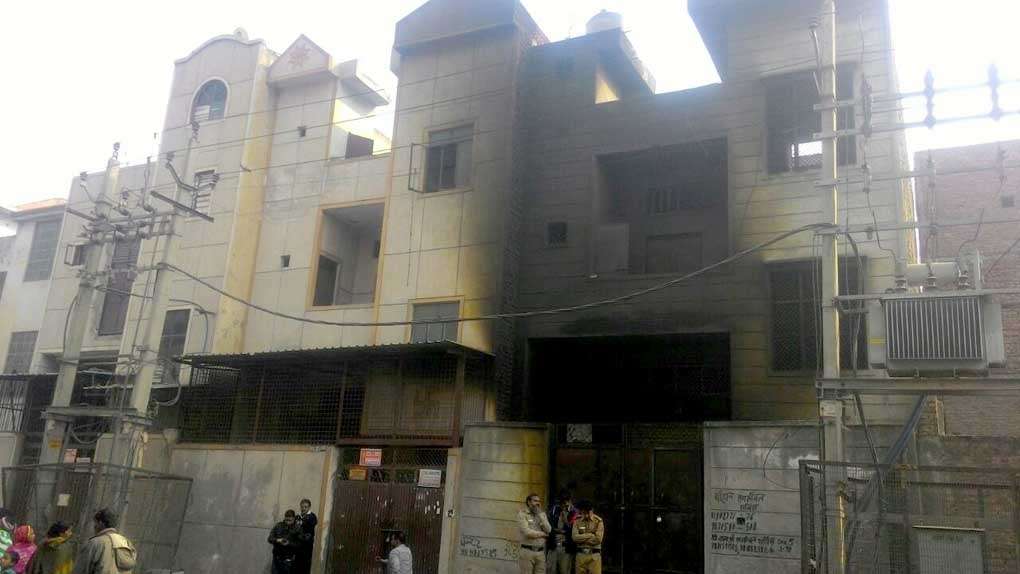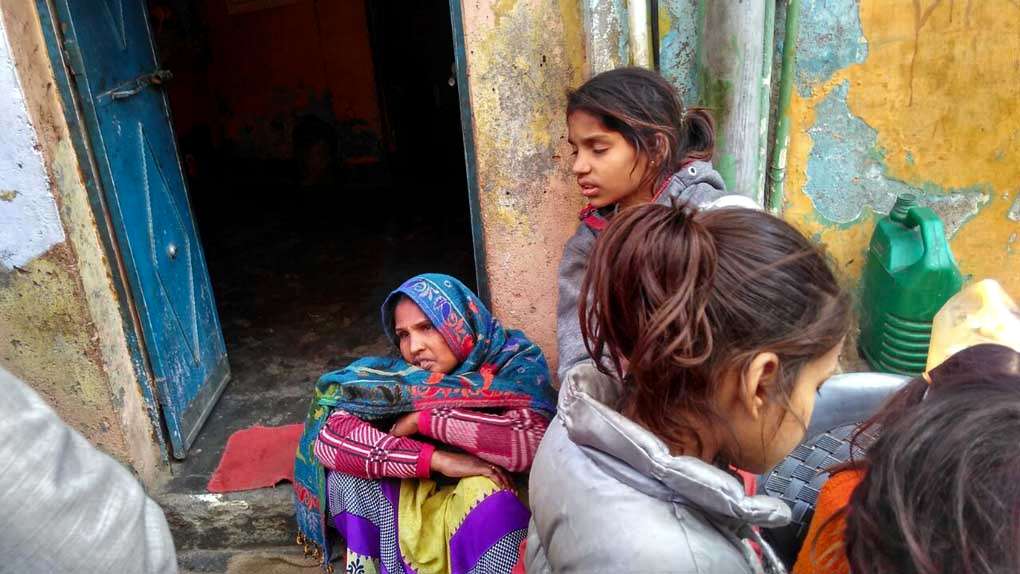
AICCTU comrades visited the factory in F-83, Bawana Industrial Area on 22 January 2018 and met family members of many workers. Many issues came to light in the conversations with workers working near the factory:
-
1. Most of the workers said that more than 17 workers were present in the factory at the time of the accident. Workers working in the area put the number at 45 to 50. A vendor selling tea nearby also reiterated that about 5 pm on that evening around 42 cups of tea were taken inside the factory.
2. People present at the spot also said that no worker was able to come out of the factory because the factory gate was locked from the outside. In Delhi owners often keep factory gates closed, with the result that in case of any accident it is not possible for workers to come out. In the F-83 factory a well as all nearby factories exits have been constructed only in one direction; hence the possibility of similar accidents will remain a constant danger in the future also.
3. The day the fire occurred in the factory was a holiday. In their talks with the victim families AICCTU comrades learnt that most of the workers were forced to work even on a holiday for fear of losing their jobs.
4. Some families reported that they had been given no information as to what kind of work the workers are made to do inside the factory. Many workers had, in fact, been told that there would be either plastic work or gulal (colour) packing inside the factory. Neetu, mother of Sonam (killed worker, age 22-23) said that had she known that her daughter would be making fire crackers she would not have allowed her daughter to go to work there; Sonam’s younger sister showed her own yellowed hands and said that Sonam’s clothes got so yellow due to working in the factory that her sisters’ hands had taken on a yellow layer because she washed those clothes.
5. Talking to Chintu, son of Baby Devi (killed worker, age about 35) revealed that their family lives in Patna District, Bihar and is dependent on the wages earned here for their livelihood. He also told AICCTU comrades that nobody has so far come to enquire about their condition. Harish, son of Rajjo (killed worker, age 50-55) said that they had so far received no wages for work done in the factory; the factory owner had not given them any identity card, and there is no provision in the factory for ESI or PF. He also told the comrades that the government has not given them any aid for the funeral rites (most of the victim families told us the same thing).
6. Family members of Madina (killed worker, age about 55, from Mauranipur, Jhansi) also said that no aid of any sort has been given to them after the accident. Madina used to work for 12 hours daily in the factory for Rs 5,000 per month. Madina was the only earning member of her family which consists of her husband and 6 children.
7. The family of Rita (killed worker, age minor) hails from Tikamgarh. According to Rita’s brother Dipu she was under 18 years old. Due to the poor financial condition of the family Rita was constrained to work at this tender age in the fire cracker factory. Workers working in nearby factories also told AICCTU comrades that children aged as young as 13-14 were working inside the factory.
8. AICCTU comrades found that in the entire Bawana Industrial Area, most factories do not display either the name of the factory or their owners’ names (see attached pics); there is no name plate of any sort on the factory gates; information about minimumwages and other details are not displayed anywhere in the entire Industrial Area.
9. An average worker works for 12 hours per day and earns Rs 5500 to 9000 per month. Workers who work for 8 hours earn only Rs 5000-5500. Most of the factories do not follow any labour laws. EESI, PF, Bonus, etc are not implemented in any factory. Workers are not given any identity cards. Most of the factories are run in buildings which have only one exit gate. At the time of the accident, the F-83 Factory exit gate as well as terrace was closed.
10. The factories in the entire Industrial Area are being run without any names, owners’ names, and without implementing labour laws. This is not possible without the criminal nexus of the Delhi government Departments (especially the Labour and Industry Departments), the MCD and the Delhi Police. All of these are guilty in the Bawana fire tragedy.
11. The government and factory owners are colluding together in Delhi to snatch away the workers’ right to form a Union. There was no Union in the factory where the fire occurred. There are no Unions in most of the factories in the Bawana Industrial Area, which is why the owners are doing whatever they wish, and workers are dying undue deaths.
12. The Delhi government has failed totally to implement the declared minimum wage. Nowhere is the minimum wage implemented in Bawana or nearby Industrial Areas such as Badli, Narela, Jehangirpuri, Wazirpur etc. If we look at the CAG Report (non-govt enterprises, year ending March 2016) we can understand clearly that the government is not willing to implement the minimum wage or any other labour law. It is clearly shown in the CAG Report that most of the minimum wage cases (58%-69%) remain pending for long periods. Between 2011 and 2015 only 27% of the 16,373 complaints related to minimum wages have been inspected by the Delhi government labour department. Also, according to this Report the Delhi government departments are not abiding by the Factories Act 1948. Between 2011 and 2015 only 11-25% registered factories were inspected.

AICCTU believes that this is no accident but the result of a nexus between government and factory owners, and policies which give more importance to profit-making than to human life. Neither the Delhi Government, nor the MCD, nor the Delhi Police is in any way free of guilt in this tragedy. Industries cannot and should not be promoted at the cost of human lives; but the government has made its stand clear by constantly standing in support of factory owners. However, workers have not borne this quietly till now and will not ear it quietly in the future also. AICCTU makes the following demands:
- Rs 50 lakh compensation to workers killed in all industrial accidents and Rs 30 lakh compensation to workers injured in all industrial accidents.
- Punishment to the officials who have given licenses to all illegal factories including the F-83 Factory in Bawana.
- Dignified government employment to one family member of each killed or disabled worker.
- All labour laws to be strictly implemented and immediate action against factory owners flouting labour laws; strictest possible punishment for owners who have sacked workers for forming Unions.
- Strict measures for ending the rampant corruption in Delhi Labour offices; appointment of Staff in Labour offices proportionate to Delhi’s worker population; opening of new Labour offices.
